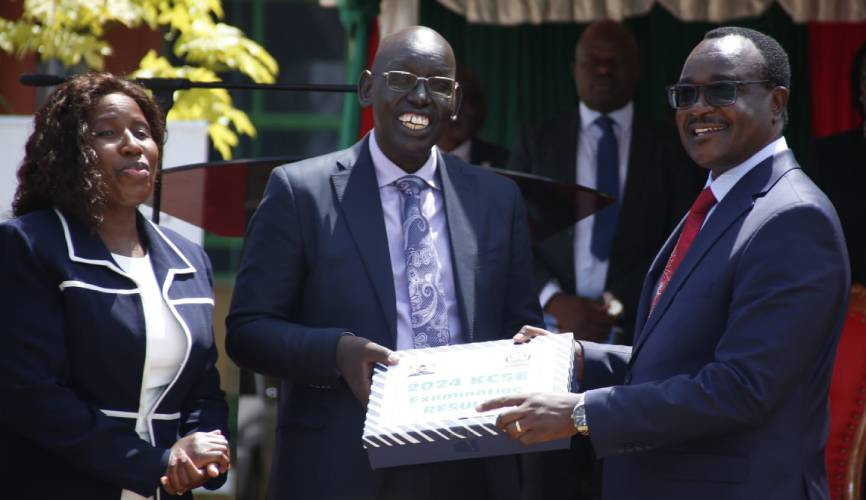
The Kenya Certificate of Secondary Education (KCSE) 2024 results are out, bringing a wave of anticipation for over 960,000 candidates and their families. This milestone marks the culmination of years of dedication and serves as a springboard for future educational and career opportunities. Beyond the grades, the KCSE results provide valuable insights into the strengths, challenges, and evolving trends in Kenya’s education system.
Key Highlights of KCSE 2024
The KCSE 2024 examinations, administered in November and December 2024, attracted significant attention due to the increasing number of candidates and efforts to uphold examination integrity.
Statistics at a Glance
- Total Candidates: 965,501
- Male Candidates: 480,310
- Female Candidates: 482,202
- Examination Centers: 10,755
- Top Grade (A): Achieved by 1,693 candidates (0.18%)
- Mean Grade Distribution: Most candidates scored grades between C and D.
The gender balance continues to improve, reflecting Kenya’s progress in promoting equal access to education.
Grade Distribution and Performance
The grade distribution is a critical measure of national performance, helping identify trends, strengths, and areas requiring attention.
Grade | No. of Candidates | Percentage |
|---|---|---|
A | 1,693 | 0.18% |
A- | 7,743 | 0.80% |
B+ | 19,150 | 2.01% |
B | 43,120 | 4.47% |
C+ | 99,338 | 10.29% |
C | 111,717 | 11.57% |
D+ | 128,885 | 13.35% |
D | 143,556 | 14.86% |
E | 48,333 | 5.01% |
Observations:
- A total of 109,924 candidates (11.37%) achieved the university qualifying grade of C+ and above.
- The majority of students scored between D+ and C, indicating significant room for improvement.
How to check your 2024 KCSE results online
- Visit the Portal: Navigate to https://results.knec.ac.ke/. Note: High traffic might slow loading.
- Enter Your Details: Input your 11-digit index number and registered name as used in the examination.
- Submit Information: Click the “Submit” button to proceed.
- View Results: Your results will appear on the screen. Print or save a copy for your records.

No SMS Option
Previously, KNEC allowed SMS-based result checking. However, this service is no longer available.
Candidates and parents now rely exclusively on the online portal or access the results through their schools.
Emerging Trends in KCSE 2024
1. Improved Gender Parity
This year, the number of female candidates slightly surpassed that of male candidates, with 482,202 females compared to 480,310 males. This milestone reflects years of concerted efforts to promote girls’ education.
2. Enhanced Regional Equity
While traditionally dominant counties like Nairobi, Kiambu, and Mombasa maintained strong performances, marginalized counties such as Turkana, Mandera, and Garissa demonstrated notable improvement, thanks to targeted interventions and resource allocation.
3. Focus on STEM Subjects
The Ministry of Education’s push for science, technology, engineering, and mathematics (STEM) education has borne fruit. Mathematics and physics saw a 15% improvement in performance compared to 2023, though challenges persist in biology and chemistry.
4. Rise of Technical Pathways
More students are exploring technical and vocational pathways, driven by increased government funding for TVET institutions and the growing recognition of alternative career paths.
Examination Integrity
Ensuring the credibility of the KCSE examinations remains a top priority.
Measures to Curb Cheating
- Technology Integration: Biometric registration and CCTV surveillance helped minimize impersonation and collusion.
- On-the-Ground Monitoring: Over 20,000 monitors were deployed to oversee the examination process.
- Deterrence: Strict penalties for malpractices were applied in 198 centers, affecting 621 candidates.
Results Validation
The Kenya National Examinations Council (KNEC) emphasized thorough vetting to uphold the authenticity of results.
Implications of KCSE 2024 Results
1. Higher Education Opportunities
- University Admissions: Students with grades C+ and above qualify for public and private universities.
- TVET Enrollment: Those with grades C and below can pursue skill-based training at technical institutions, aligning with the government’s “Big Four Agenda” on manufacturing and industrial growth.
2. National Development
The results underscore the critical role of education in driving economic growth, fostering innovation, and reducing poverty.
3. Policy and Curriculum Reforms
Insights from the KCSE results will guide ongoing reforms, including the transition to the Competency-Based Curriculum (CBC), aimed at equipping learners with practical skills and critical thinking abilities.
Challenges and Recommendations
Challenges:
- Disparities in Resource Allocation
Rural and marginalized areas still face limited access to quality teachers, textbooks, and infrastructure. - Examination Pressure
The current system’s emphasis on grades as the sole determinant of success creates undue stress for students. - STEM Underperformance
Despite progress, STEM subjects require further investment and teaching innovations.
Recommendations:
- Increase Funding for Education
Allocate more resources to schools in underserved regions to level the playing field. - Strengthen Teacher Training
Empower educators with modern teaching methodologies and tools. - Promote Holistic Learning
Encourage co-curricular activities and mental health programs to reduce examination-related stress.
The Future of KCSE and Education in Kenya
The KCSE results are not just an end but a beginning. As Kenya transitions to the Competency-Based Curriculum, there is hope for a more practical, skill-based education system that caters to diverse talents.
Key focus areas for the future include:
- Expanding access to digital learning tools.
- Strengthening public-private partnerships in education.
- Redefining success beyond academic grades.
Checkout: The Junior Secondary Schools (JSS) Guidelines
FAQs
When were the KCSE 2024 results released?
The results were released on January 7, 2025.
How can students access their results?
Students can check their results through the KNEC portal here.
What are the university qualification grades?
A mean grade of C+ or higher qualifies candidates for university admission.
What about students who scored lower grades?
Students with grades below C+ can join TVET institutions, pursue diploma courses, or explore skill-based programs.
How can schools improve STEM performance?
Schools can enhance STEM education by investing in modern laboratories, teacher training, and interactive learning tools.
The KCSE 2024 results reflect the resilience and determination of Kenyan students and the dedication of educators across the country. While celebrating top performers, the results also highlight areas requiring attention to ensure every learner has an equal chance to succeed. As Kenya embraces educational reforms, the future looks promising for a generation ready to lead in innovation, sustainability, and economic transformation.
Let us celebrate the achievements while striving for a more equitable and inclusive education system that leaves no learner behind.





